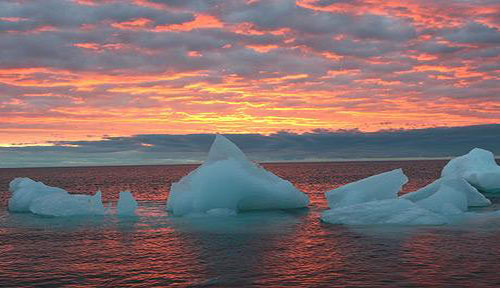Arctic will melt ice after 5 years
According to a recent forecast by some scientists, after 5 years the Arctic will have melted ice phenomenon in the summer.
>> The ozone layer in the Arctic declined record
Previously in 2007, a group of scientists led by Professor Wieslaw Maslowski - working at the Naval Postgraduate Training School in Monterey (California, USA), each forecast that by 2013, the Arctic will No more ice in the summer. The reason is fast melting of ice. But this forecast has been opposed by some scientists.

The Arctic will melt ice in the summer.
However, recently re-researched on the new computer model - simulating real-world interactions between the Arctic Sea, the atmosphere, ice and rivers carrying freshwater to the Arctic Sea, Professor Wieslaw's group. Maslowski adjusted this time to 2016.
Also related to melting ice in the Arctic, on April 5, the World Meteorological Organization (WMO) said that in the winter, the ozone layer in the Arctic has been declining at a record rate due to the ozone depleting substances continue to exist and temperatures are too low.
According to WMO data, from the beginning of last winter until the end of March 2011, the ozone layer thickness in the Arctic has decreased by about 40%. The highest decrease previously recorded by WMO is about 30%.
- The Arctic temperature is the highest in 44,000 years
- In 40 years the Arctic will run out of ice?
- Ice melted massively, 100 years from now, will the Arctic still have ice?
- Arctic ice will melt?
- The Arctic may run out of ice within a decade
- For the first time in 100,000 years, the Arctic ice can melt completely
- The Arctic lost three times as much ice as Belgium every day
- Perennial ice in the Arctic is disappearing
- From now until 2080, the Arctic ice can melt completely
- Every second 14,000 tons of water flows into the sea because the Arctic ice melts
- Ice in the Arctic is likely to disappear by 2030
- 7 irreplaceable roles of the Arctic sea ice
 Is the magnetic North Pole shift dangerous to humanity?
Is the magnetic North Pole shift dangerous to humanity? Washington legalizes the recycling of human bodies into fertilizer
Washington legalizes the recycling of human bodies into fertilizer Lightning stone - the mysterious guest
Lightning stone - the mysterious guest Stunned by the mysterious sunset, strange appearance
Stunned by the mysterious sunset, strange appearance